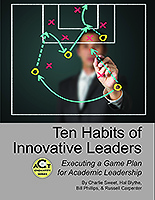Key Information
Ten Habits of Innovative Leaders: Executing a Game Plan for Academic Leadership, By Charlie Sweet, Hal Blythe, Bill Phillips, & Russell Carpenter
2018 [ISBN: 1-58107-317-8; 144 pages, 8 ½ x 11 inches, soft cover] $37.95
 This book pulls back the wizard’s curtain to reveal the dispositions, habits, and strategies of highly effective innovative leadership into academia as well as other fields. For their foundational definition of leadership, the authors like the one used by a highly respected name in the field, Peter Northouse: “Leadership is a process whereby an individual influences a group of individuals to achieve a common goal.” This book will not detail the various styles of leadership, but instead will concentrate on the particulars of developing an innovative approach to leadership from the ground floor up.
This book pulls back the wizard’s curtain to reveal the dispositions, habits, and strategies of highly effective innovative leadership into academia as well as other fields. For their foundational definition of leadership, the authors like the one used by a highly respected name in the field, Peter Northouse: “Leadership is a process whereby an individual influences a group of individuals to achieve a common goal.” This book will not detail the various styles of leadership, but instead will concentrate on the particulars of developing an innovative approach to leadership from the ground floor up.
The Content
I. Introduction to Highly Effective Innovative Leadership / 1
Innovative Academic Leadership / 3
The Enemies of Innovative Academic Leadership / 7
Dispositions as a Foundation for Academic Leadership / 13
II. The Ten Habits of Highly Effective Innovative Leaders / 19
An Overview of the Ten Habits of Highly Effective Innovative Academic Leaders / 21
Habit #1: Live the Curious Life / 23
Habit #2: Open Yourself to New Ideas / 27
Habit #3: Take Proactive Steps / 31
Habit #4: Carve out Time Daily to Reflect on Possibilities and Innovations / 36
Habit #5: Take Risks / 39
Habit #6: Seek Progress over Perfection / 43
Habit #7: Empathize / 47
Habit #8: Be Optimistic—Problems Are Opportunities / 53
Habit #9: Set High Goals / 57
Habit #10: Model Innovative Habits / 63
III. The Nine Strategies of Highly Effective Innovative Academic Leaders / 67
An Overview of the Nine Strategies of Highly Effective Innovative Academic Leaders / 69
Strategy #1: Catch Glimmers / 71
Strategy #2: Collaborate / 75
Strategy #3: Brainstorm / 81
Strategy #4: Piggyback / 85
Strategy #5: Shift Perception / 89
Strategy #6: Play / 93
Strategy #7: Recognize Patterns / 99
Strategy #8: Use Metaphor / 105
Strategy #9: Go with the Flow / 109
IV. Game-Planning / 115
Simplifying, Synthesizing, and Acting: Developing a Practice Schedule / 117
Afterword / 121
Appendix A. Other Highly Effective Habits of Innovative Academic Leaders / 123
Appendix B. 50 Quality Quotes on Leadership, Creativity, and Innovation / 127
Appendix C. Extra Exercises to Enhance Leadership, Creativity, and Innovation / 131
Appendix D. For Further Reading / 135
The Authors
Charlie Sweet, Ph.D. (Florida State University, 1970), is the Co-Director of the Teaching & Learning Center at Eastern Kentucky University. With Hal, he has collaborated on over 1,300 published works, including 30 books, literary criticism, educational research, and novels (as Quinn MacHollister).
Hal Blythe, Ph.D. (Louisville, 1972), is the Co-Director of the Teaching & Learning Center. With Charlie, he has collaborated on over 1,300 published works, including 30 books (eight in New Forums’ popular It Works For Me series), literary criticism, educational research, and a stint as ghostwriter of the lead novella for the Mike Shayne Mystery Magazine.
Bill Phillips, Ed.D., (University of Southern Mississippi, 1988), is former Dean of the College of Education at Eastern Kentucky University and a collaborator on Achieving Excellence in Teaching, 2014.
Russell Carpenter, Ph.D. (University of Central Florida, 2009), is Executive Director of the Noel Studio for Academic Creativity and Program Director of Applied Creative Thinking at Eastern Kentucky University where he is also Associate Professor of English. Dr. Carpenter has published on the topic of creative thinking, among other areas, including three texts by New Forums Press: Introduction to Applied Creative Thinking (with Charlie Sweet and Hal Blythe, 2012), Teaching Applied Creative Thinking (with Charlie Sweet, Hal Blythe, and Shawn Apostel, 2013), and It Works for Me, Flipping the Classroom: Shared Tips for Effective Teaching, (with Hal Blythe and Charlie Sweet, 2015). He has guest edited or co-edited special issues of the Journal of Faculty Development on social media and the future of faculty development, and now serves as the journal’s editor. In addition, he has taught courses in creative thinking in EKU’s Minor in Applied Creative Thinking, which was featured in the New York Times in February 2014, and rhetoric and composition in the Department of English.
